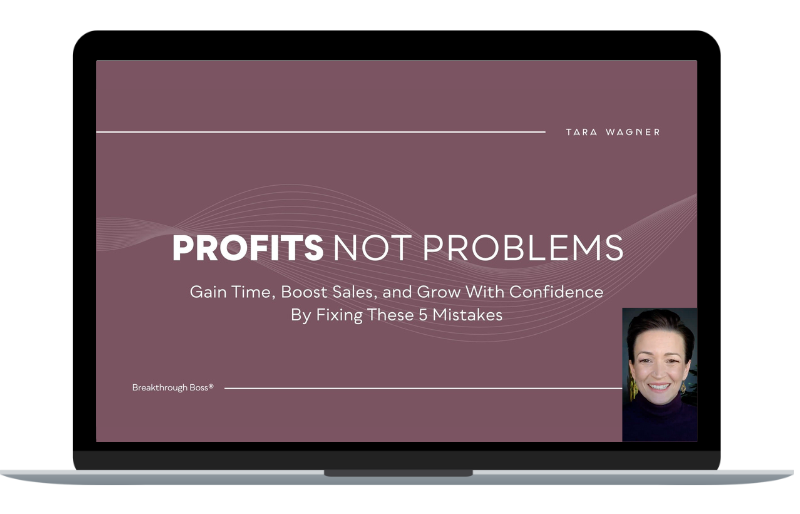Did you know that there are actually three different types of perfectionism and two different ways that it can show up in your life and your business and keep you from being happy and successful? And did you know that a big number of perfectionists don’t look like perfectionists at all?
Let’s go through this list of signs and symptoms of perfectionism and see which ones surprised you.
Watch here or read on below:
Let’s start off with the three different types of perfectionism.
- Type #1: Self-Oriented – These are the people who have very high personal standards, but they tend to be more forgiving of others. And interestingly enough, this type is made up of mostly women.
- Type #2: Other-Oriented Perfectionist – These are the ones who have very high standards for other people, not necessarily for themselves. They hold everybody else to a higher standard.
- Type #3: The Socially Prescribed Perfectionist – This is the person that believes that others expect perfection from them, so they strive to meet other people’s standards.
But among those three types are actually two different styles.
- Style #1 – Overt Perfectionists – These are the overachievers. They’re your classic type A people. These are the ones that are just obviously perfectionists because they meet most of the common symptoms that we’re going to describe in just a minute.
- Style #2 – Covert perfectionists – This is the one that surprises most people.These are the ones that no one would guess are actually perfectionists. They are the under-performers and they underperform because they believe that it should be perfect, but it can’t be so why even try? These are the ones that oftentimes people will think are lazy or uninterested, but actually, they just have impossible standards that they know they can’t hit.
Me personally, I can be both self and sometimes other-oriented, especially when I’m under a lot of stress. I tend to expect perfection from others and it tends to be pretty overt. I’m not a very covert person about this. It’s pretty obvious that I am an overachiever.
Alright, so let’s go through 29 symptoms of perfectionism.
I’m sure that you could probably add a few more to the comments below so make sure that you do. I’m going to go through these in order of most obvious to least obvious. And I want to dare you to count up the ones that relate to you to see how many you can check off yourself. Hopefully, you won’t have a perfect score.

Symptoms of perfectionism
#1 – Redoing small tasks over and over.
This will be proofing, fine-tuning, perfecting little tiny details on the things that you’re working on.
This is the most obvious one, right?
This is the one that everybody thinks that all perfectionists deal with. Not all of them do, but it is a really common one. You’re especially going to notice details or issues or typos, things that other people aren’t going to notice, because that might just be the way that your brain works. You just kind of zero in on the things that need fixing. And that’s not necessarily a bad thing, but obviously, it can become a problem.
#2 – Redoing big projects over and over.
You get almost to the end of it and then you’re like, I don’t like it. I scrap it. I want to start all over again.
This is probably one of the most detrimental symptoms of perfectionism because it really leads to burnout. If you feel like whatever you’re creating is just never going to be good enough and you’re constantly starting over from scratch.
#3 – Picturing other people judging you.
I’ve always had this picture in my mind of people with pitchforks. I don’t know what it’s about, but that’s how that shows up for me. It might show up differently for different people.
There might be specific people that come to mind when you’re worrying about making mistakes. It might be non-specific people. It might just be my people with pitchforks. There’s never any pictures or faces on those people. It’s just a group of angry people with pitchforks. However that shows up for you, it’s really important to understand that this is actually a symptom of perfectionism worrying too much about what other people are going to think or say, or how they’re going to react.
#4 – Judging other people and enjoying their failures.
If we have these really high standards, either for ourselves or other people, we can be really judgmental when other people aren’t reaching those same standards, but we can also feel kind of happy when they don’t because if we’re not reaching those standards, it makes us feel better when other people don’t either.
If you kind of catch yourself being judgy, that could actually be a sign of underlying perfectionism.
#5 – Never feeling satisfied, especially satisfied with outcomes.
When something is all said and done, you look at it and you just see how it could have been better, how it should have been better, how it wasn’t exactly what you wanted it to be. You never really allow yourself to enjoy it. You never really allow yourself to feel happy about something.

#6 – You have a lot of the symptoms of a fixed mindset (and there are a lot of them).
So if you want to go through those, make sure to check out this video.
#7 – You can’t concentrate if things are messy or disorganized
Oh, that one rings some bells, right?
It’s this idea, if our desk is a mess, our offices a mess, our house is a mess. We can’t focus on what we need to focus on.
It happens because our brains are so oriented around, seeing the imperfection, seeing what’s wrong. We’re focusing on that. And we can’t keep ourselves focused in the right direction.
This doesn’t mean that you should have to put up with a mess or be disorganized to be a happy person. That’s not what it means at all. It just means that we should be able to, or we should learn how to shut off what doesn’t matter so that we can focus on what does.
#8 – You take a long a** time to make a decision
Probably because you’re worried about making just the right decision and you’re worried about making any mistakes. You want to make sure that you get it right, that you don’t mess anything up, that you avoid every potential problem. You don’t realize that that’s just natural like you just can’t avoid every potential problem. You will make mistakes. And that’s how you get to the right decisions is by figuring out some of the wrong ones.
#9 – You spend hours researching the best of everything.
The best restaurant, the best book, the best software, the best whatever it is, you’re going to read through every review. You’re going to just research, research, research, and again, take forever to make those decisions because you’re trying to make the best one, no mistakes, no imperfections. It’s gotta be just right.
#10 – You say things like “I just have high standards and I don’t see what’s wrong with that”.
I’m laughing because I’m taking this from my own life right now. I say that exact thing all the time. And again, I like my high standards and you might like your high standards too, but we both get to learn how to make sure those high standards are not actually making us miserable or making the people around us miserable as well.
#11 – You find yourself saying things like “If I want it done right, I have to do it myself“.
Because as a perfectionist, we can often not trust other people to do it well, we think that it has to be perfect and we know what perfect is. Therefore, we have to get in there and do it. And we don’t allow other people the opportunity to try or to learn or to make mistakes or to get better at something. Because we jump in and make sure that it’s getting done correctly.
#12 – You won’t hire.
This is especially if obviously, you’re in a business or if you’re not in a business, you won’t delegate. You won’t let anything go. Everything has to be yours. You have to do it just the right way again, you know, the right way to do it. And you got to do it yourself. And so you won’t ask for help and you won’t receive help when it’s offered to you.

#13 – You micromanage the people you do hire or delegate to.
You’re over their shoulder. You’re nitpicking. You’re telling them what they should be doing. And then probably you’re just jumping in and getting it done for them.
The thing we need to remember as perfectionists is that it doesn’t necessarily matter how it’s done. What matters is the final outcome. And we got to let people kind of have their way of coming to that final outcome because everybody has a different method. Everybody has a different style. Everybody has a different learning style or approach to figuring things out. And we need to respect that.
And as perfectionists that can be really difficult to do because we are so keenly aware and tuned into all these little micro details that probably don’t matter to anybody but us than we are to that final outcome.
#14 – You care more about positive feedback than helpful feedback.
And what I mean by this is that as perfectionists, we can really try to avoid what we consider negative feedback. Any sort of constructive criticism is going to hit us really hard because we’re really concerned with the way things look and are they just right?
We want to hear lots of positive feedback, lots of praise, lots of acknowledgment. Lots of thank you’s. Lots of gratitude. Lots of basically stroking our ego because it will calm down that inner perfectionist versus coming at it with a growth mindset and really saying, “okay, I need helpful feedback. Tell me what your real experience was. How could I improve this? How could I make this better?”.
Not in a constantly tweaking it because it’s never perfect, but in a, let me develop, let me grow. Let me look at the things that I’m uncomfortable looking at. Let me look at my shortcomings, let me look at my imperfections, and be okay with them so that I can develop them.
#15 – You struggle with Impostor Syndrome.
And I have a video on symptoms of Impostor Syndrome. If you want to check that out, click here. It’s a little bit eye-opening and uncomfortable. And there’s a lot of overlap between Impostor Syndrome and perfectionism. So I highly recommend checking that one out too.
#16 – You crave approval, but when you receive it, you struggle to believe it.
Somebody might give you positive feedback and then you’re just like, “oh, they’re just saying that”. Or “they’re just shining me on”, or “that’s just not true” or “they’re crazy” or whatever. You cannot accept the fact that things are actually good. That they’re good enough. And that they’re actually good enough to make other people happy because they’re not making you happy.
Yeah. That one kind of stings a little bit, but it’s really important that we understand that approval is great, positive feedback or helpful feedback is also great, but we’ve gotta be able to look at the truth of something.
We gotta be able to look and see when something can be improved. And we got to look and give ourselves credit when it actually doesn’t need to be improved.

#17 – Turning compliments into self-criticisms.
This will happen when somebody does give you a compliment, but you turn around and you say something negative about yourself. “Well, yeah, but I could have done this”, or “I didn’t do that”, or “I messed this up”.
How many of us have done that?
Somebody will say, “Wow, that was really great. I love what you did there”. And you’re like, “yeah, but I really messed this up” and “I don’t like the way this turned out”, and “that’s not good enough”.
And anytime we are turning it around into a self-criticism and not just accepting the praise, accepting it with gratitude and saying “thank you”, but really turning it around into, “I’m not good enough”. That is such a clear sign of perfectionism that we really need to pay attention to.
#18 – Putting off sharing ideas or projects for too long.
I have a whole video on when you should share your ideas and your goals because there is a strategy to this. We don’t want to share things too soon, but as perfectionists, we can put off ever sharing things.
People will not even know that we have a business sometimes when we’re working on a goal because we don’t want to share it because we’re afraid. If we make mistakes, if it’s imperfect, if we don’t reach that goal, then we have to actually, you know, admit that to people. People will know that we’re imperfect and that we didn’t figure it out or we didn’t get it right. And so we will not tell people that need to know. We won’t share things. We won’t celebrate things. We’ll just kind of keep everything hidden.
#19 – You get so frustrated if your routines get interrupted.
As perfectionists, we can kind of be a stick in the mud, right? This is the way that things should go. This is the way that the day should look. This is how things should be done. And when life is life and it’s messy and it needs us to be flexible, we can be completely inflexible because we are so stuck in that right way of things actually going.
#20 – Thinking that failure is something to avoid versus it being a natural part of the process.
So often we have so many connotations around failure and that it shouldn’t happen. I want to challenge you to find one successful person who does not have failure in their past failure is what gets it’s you to success. It’s what helps you to learn. It’s what helps you to master something.
You can’t just know the right way to do it. You got to know it so deeply that you know, all the wrong ways to do it too. And that only happens when we mess up, make mistakes, or fail at something.
#21 – You avoid things that are hard because you don’t want to fail.
You don’t want to mess it up. You don’t want to make mistakes. You just keep it easy, right? This is where you start to look like that underachiever or that covert perfectionist.
Because if something is too hard and you don’t feel like it can be perfect, you don’t feel like you can really get it to the level that you’re supposed to get it to. You’re not going to do anything at all. You’re just going to avoid it. You’re going to take the easy route. And the easy route often looks like not doing much of anything at all.

#22 – You have no idea how to even celebrate your wins.
This is because as perfectionists, we can be so focused on the imperfections where it’s not there yet- how much further we have to go. We’re so focused on overachieving that we don’t slow down to celebrate the achievements that we’ve had all along the way. And a lot of people will be like, “well, you, what does it matter?” -this was definitely me in the past. I was like, “what does it matter if I celebrate something?”. And to this day, I’m still kind of struggling to slow down and remember to savor the moment and celebrate it.
Here’s why it matters, because when you celebrate, it feels good. And when you feel good, you can do good and your life is better.
If you can actually just savor something and enjoy something for once versus constantly looking at what’s wrong with it, or what’s next, your life is going to change. Like it really, it sounds simple. It sounds simplistic. It sounds too easy, but it really does make a big difference. When we allow ourselves to just celebrate our wins, it actually gives us more motivation. It actually helps us to get more done and it helps us to make more improvements when we actually feel good about the progress that we’re making.
#23 – If you are an other-oriented perfectionist, you are going to feel easily irritated when people make mistakes or they mess up or they’re lazy, or they’re imperfect
Because you’re holding people to a really high standard. Maybe it’s the same standard you hold yourself to. Maybe it’s a higher standard than what you hold yourself to. But when they’re not reaching that standard, you’re going to be supercritical. And it can really come across as irritation with others because they’re not reaching the standards that you’re trying to hold them to. It doesn’t matter what their standards are. It matters what you want from them. And the perfectionism that you’re kind of placing over them.
#24 – You struggle to open up to other people
Opening up to other people means being vulnerable and sharing our imperfections, and showing that we are human and that can be really uncomfortable when we think that we need to be perfect. So it’s really common for perfectionists to kind of like hold themselves tightly buttoned, or keep their cards close to their chest or not easily develop relationships with people because of that discomfort with they’re going to see that I’m not good enough. They’re going to see that I’m imperfect. What are they going to think of me and so on?
#25 – You have an all-or-nothing personality.
Your motto is “go big or go home”. You are all in, or you are completely checked out.
This is relatable. This is something that I’ve definitely struggled with this idea of like, if I can’t do it to a 100% capacity, again, what’s even the point of trying. It’s really important when we notice this to make sure that, you know, we’re doing this in a healthy way that we understand when it’s appropriate to do this and that we’re not just checking out because we think that something can’t be perfect.

#26 – Insisting that you need to see the big picture before taking any action.
Again, this is really relatable, here’s a common way that this shows up for me. If I am going through a course, some sort of program, or process, or something like that, I need to actually watch everything, learn everything, figure out the big picture and then come back and start taking action.
Sometimes this is helpful. It’s just my learning style. I’m a big picture thinker, but sometimes I end up doing this simply because I don’t want to make a mistake and have to go back and redo it. So it’s that perfectionism coming in. That’s actually stopping me from making progress. I’m spending so much time trying to wrap myself around the big picture, sometimes overwhelming myself and making it so I can’t take any movement at all, or any steps at all, instead of just starting to take steps and figure it out as I go along.
If you catch yourself doing this, it’s really important that you know where to draw that line.
“How much of the big picture do I actually need?” versus “do I need every single detail of the big picture before I can start taking steps?”.
Remind yourself that it’s okay to take some steps and come back and redo them because that is the process of learning and getting things better. We don’t get things right on the first try. We get things right by putting them out there, getting feedback on them, coming back and tweaking them, putting them out there, again, getting feedback on them, and coming back and improving it. It’s a process, right? And it spirals up over time. It’s not just one straight line to the top, but we really get to come back to things again and again, to make them better and better.
#27 – You don’t bounce back from setbacks very easily.
They hit you really hard. You take it really personally. If you have a setback, it can often feel like life is out to get you or that you’re never gonna win. So why try? And it really can just spiral further down. This doesn’t often get related to perfectionism, but it’s actually a really common trait with perfectionists because they have these high standards. If they don’t reach them, they take it as a sign that there’s something wrong with them.
So if this is something you catch yourself doing, I highly recommend that you watch the videos on The Fixed Mindset and The Growth Mindset. Those are going to be super helpful and really just work on your mindset that I am good enough. It’s okay to make mistakes. And it doesn’t mean that I’m a bad person, just because maybe I did a bad thing, or I just didn’t do it in the best way possible.
#28 – Laziness.
Just not feeling motivated, being an underachiever. And we’ve already talked about this a little bit, but if you find yourself just not really wanting to do anything, like you’re just sitting around like, “eh, what’s the point? I don’t really care. I don’t really have goals”. Ask yourself, is that because you actually do have really high standards for things, you actually do believe that there’s a right way to do it, but that you can’t do it and therefore you’re not even going to try.
I know a lot of these types of perfectionists I’m related to some of them. Once I realized that it was actually perfectionism, it really helped me to know how to support them better because now it wasn’t just encouraging them to go and do something. It was encouraging them to know that they could do something.
So use that for yourself. Remind yourself that, “Yes, I can do this. Yes, there’s going to be setbacks. Yes, there’s gonna be challenges. No, it’s not gonna be perfect. It might be a long road to get to that point of the results that I want, but I can figure that out. This is normal and natural to put in that time to pay my dues, to be able to get there over time and not overnight.”
#29 – Depression.
Depression is a really common symptom of perfectionism. When we have these high standards and we’re not reaching them. We end up feeling not good enough. And when we feel not good enough, all of life feels pointless.
So if you are somebody who is struggling with depression, or you’ve struggled with depression in the past, ask yourself, is this at the root of it? Is this feeding into this depression, because until you heal that piece, that belief, it’s going to be really hard to be able to move out of that depression?
DO SYMPTOMS OF PERFECTIONISM HAVE YOU FEELING BURNT OUT?
Be sure to jump on my free training, How to Use a Holistic Approach to Create a Profitable Business Without Burning Yourself Out. I’ll talk about 3 massive mistakes that will lead you to burnout and closing your business. I’ll also show you my Healthy Hustle approach that allows me and my clients to create multi-6 figure businesses in 20-25 hours a week.
Learn more and grab your seat by clicking the button below.
What about you, boss lady?
How many of these signs and symptoms of perfectionism do you resonate with? Hey, no shame. You’re human. And we’re all going to be messy and imperfect, but how do you make sure that your perfectionism is healthy, striving, and not an unhealthy pressure on yourself?
Scroll down to leave your comments below.




